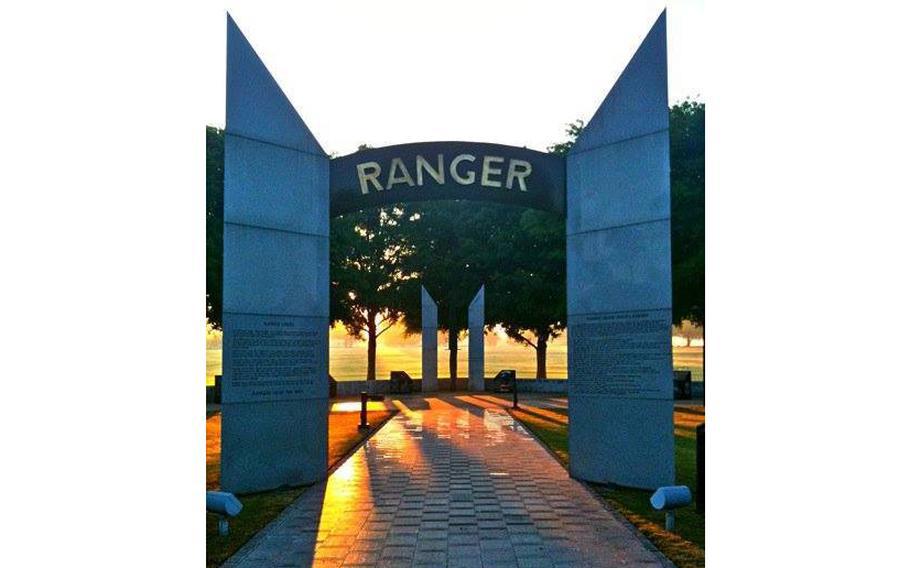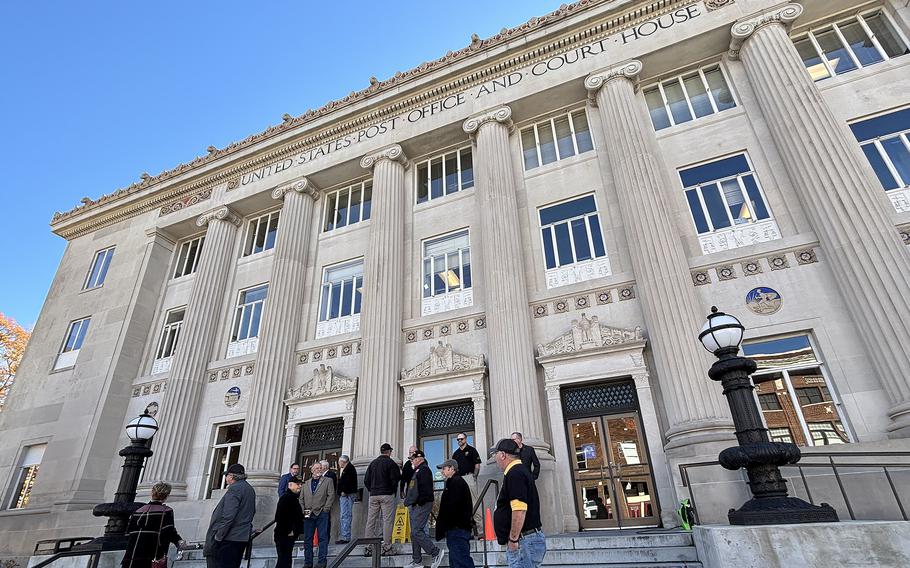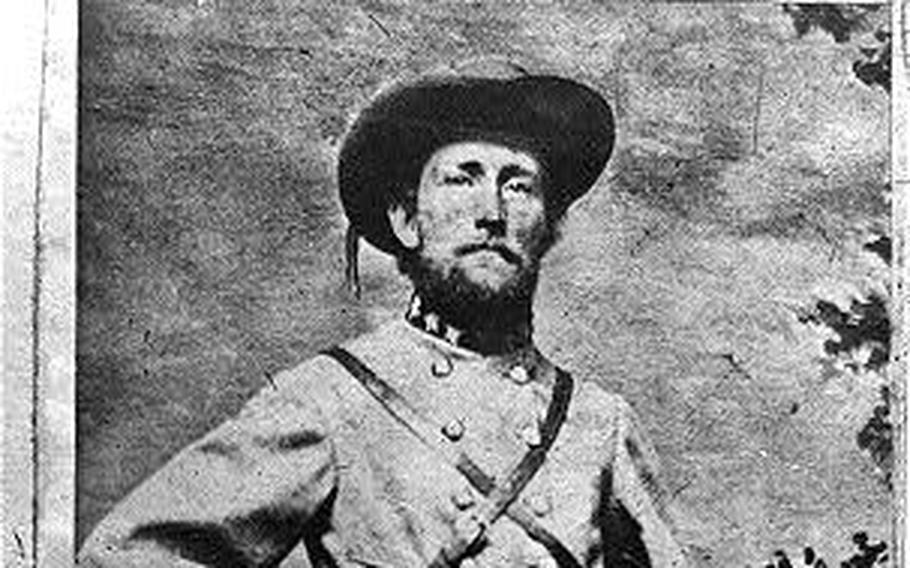
The Defense Department is being sued by the National Ranger Memorial Foundation to reinstate the name of Confederate Col. John S. Mosby to Fort Moore’s Ranger Memorial and as a member of the Ranger Hall of Fame. (National Ranger Foundation/Facebook)
COLUMBUS, Ga. – An Army Ranger foundation’s lawsuit seeking to reinstate a Confederate officer to a Fort Moore memorial hinges on an inconsistency in a congressional panel’s report that identified military items that must be stripped of ties to the Confederacy, the group’s attorney argued in federal court.
Jonathan Corley, the attorney for the National Ranger Memorial Foundation, told U.S. District Judge Clay Land that the judge should allow the suit to continue to the evidence-gathering stage because it is unclear why the Pentagon’s Naming Commission identified Col. John Mosby’s name to be removed from the Ranger memorial in the body of its September 2022 report but omitted the Confederate from a final list in the report’s appendix.
“Maybe they changed their minds,” Corley said Thursday of the commission. “That is why we want discovery … to find out what happened between the body of the report to [Mosby’s] non-inclusion on the list in the appendix.”

Supporters of the National Ranger Memorial Foundation gather in front of the U.S. District Court for the Middle District of Georgia in downtown Columbus on Thursday, Dec. 12, 2024. A hearing on the foundation’s lawsuit to reinstate the name of Confederate Col. John Mosby to the Ranger memorial at Fort Moore, Ga., was held in the courthouse just miles from the Army post. (Corey Dickstein/Stars and Stripes)
The Naming Commission was established by Congress in 2020 to make recommendations on scrubbing the U.S. military’s bases of items linked to the Confederacy, including the renaming of nine Army bases that honored Confederate leaders.
Corley argued the 17-page list of hundreds of items for removal from those nine Army bases, which included Fort Moore, formerly known as Fort Benning for Confederate Brig. Gen. Henry Benning, was the specific list that the Naming Commission provided the Pentagon to have scrubbed. He said every other item named in the body of the three final Naming Commission reports appeared on the lists in their appendices.
“The list, itself, identifies itself as the list,” Corley told the judge. “It is the list.”
A Justice Department attorney representing the Pentagon dismissed the inconsistency as unimportant in the case, which the federal government has sought to have dismissed as lacking merit.
“It is not ambiguous. It is clearly in the text,” said Sarah Suwanda, the Justice Department attorney. “The [law] says, ‘remove all names … that commemorate or honor those who voluntarily served the Confederate States of America.’”
“If [Mosby] was not in the body of the report, we would agree, but it is there.”

Undated photo of Col. John S. Mosby, a Confederate cavalry commander known as the “Gray Ghost” for leading daring raids on Union forces. (Library of Congress)
The Naming Commission’s list in its appendix did specify at least six other items associated with Mosby to be removed or renamed, including a range and an airstrip at Fort Moore.
The foundation filed its suit last year against the Pentagon to return Mosby’s name to the memorial as an inaugural member of the Ranger Hall of Fame, arguing Fort Moore leaders and the Pentagon overstepped their authority in removing it. The memorial is a privately funded monument for Army Rangers that was gifted by the foundation to the service for display at Fort Moore, which is home to the Army’s Ranger School, the 75th Ranger Regiment’s headquarters, its 3rd Battalion and the annual Best Ranger Competition.
Foundation officials argued Mosby’s name should not have been removed, in part, because after his Confederate service he went on to serve decades in the U.S. federal government as an assistant U.S. attorney and as U.S. consul to Hong Kong.
Barry Todd, the foundation’s president, described Mosby as “an honorable man.” Mosby wrote after the Civil War that he opposed slavery and secession, but he joined the Confederate army in 1861 out of loyalty to his family and his native state of Virginia.
More than two dozen former Rangers and other supporters of the National Ranger Memorial Foundation attended the hearing Thursday at the downtown Columbus federal courthouse, just miles from the gates of Fort Moore.
Corley at one point during the hearing alluded to the crowd in attendance, telling Land that Mosby was “important to these people” and he was enshrined on the monument for developing “tactics and maneuvers [that] are still studied today.”
Known as the “Gray Ghost,” Mosby led a band of Confederate cavalrymen known as Mosby’s Rangers, who conducted daring raids on Union forces, often behind their lines. In 1992, he was inducted into the initial class of the Ranger Hall of Fame. He remains the only Confederate ever admitted in the group.
Land at times appeared to doubt the foundation’s arguments to reinstate Mosby’s name to the Ranger Memorial. He posited the Naming Commission’s omission of removing Mosby’s name from the memorial in its appendix list was likely a “clerical error.”
“It seems clear to me that they intended for him to be removed from the memorial and some mistake was made,” the judge said.
But Land left open the possibility he would allow the lawsuit to move forward. He said Thursday that he would consider the case further and issue a written ruling in the future. No timetable was offered.
Mosby “should have been listed in the appendix,” Land said. “Someone made a mistake here. Or not. Ideally, if [the commission] wanted to remove him, he would be on the list.
“They messed up by not listing him on the list – that appears to be what happened.”